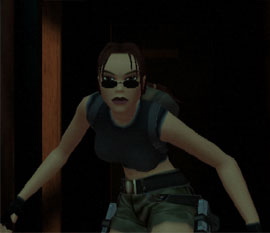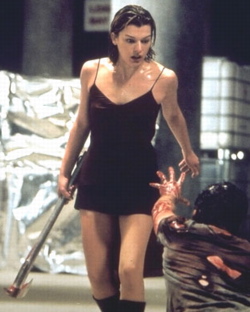We are developing the social individualist meta-context for the future. From the very serious to the extremely frivolous... lets see what is on the mind of the Samizdata people.
Samizdata, derived from Samizdat /n. - a system of clandestine publication of banned literature in the USSR [Russ.,= self-publishing house]
|
The BBC are broadcasting a series of documentaries purporting to show crises that could affect Britain over the next two to three decades. It is already clear from the subjects tackled: the dangers of gated communities, the bankruptcy of pension systems, the rise of obesity and the superiority of women, that they were written from a left-wing viewpoint that hypes up the modish problems of the would be regulators. The striking omission is the nightmares conjured up by the Greens but they will no doubt form the subjects of a second series.
If you do catch these, then try to spot the technological innovations that spice up the world of the future.
As part of this conversation, the BBC asks for views of the world in 2020 and I thought that it would be rude not to oblige.
By 2020, we will no longer have to pay the licence fee to watch substandard populist rot that masquerades as quality TV, notably, the series of poor documentaries called If.
If Iran or Al Qaeda obtain weapons of mass destruction, then we can expect them to unleash a second Holocaust, in order to remove Israel from the Middle East. Half of Europe will revile this, half will be relieved.
One or more countries will withdraw from the European Union due to its institutional inflexibility and inability to compete with the United States or the Far East.
There will be further wars in the Middle East involving the West (without a UN mandate) due to the threat of Islamic fundamentalism and terrorism in oil producing areas.
It was an antidote to some nauseating missives extolling peace in our time and a World Union (based on the European Union). One would have thought the barbarities of twencen would have extinguished this Fabian and Wellsian nonsense.
The naming of planets is a difficult matter. Sedna may have strong references for the Inuit, but it means nothing at all to most of us. You could argue that Sedna is more thrilling than the planetoid’s original designation, 2003 VB12, but it doesn’t conjure up a fitting title for inclusion in Holst’s The Planets.
However, the sinister appearance of a red planet (and possible moon) reminds me of Dr. Who’s deadly enemies, cursed to wonder the frigid spaceways, enshrined in their tombs. Is this not the tenth planet, home of the Cybermen? And surely there can be no more fitting name than Mondas.
Prepare for child-like logic, silver suits and a puzzling vulnerability to gold.
…which is seldom a bad thing.
Spiked-online is generally an interesting site, with challenging articles which often hit the nail (more or less) on the head. And sometimes not. In The geek shall inherit the Earth, I think that it would be best to say ‘your meta-context is showing’. I have met Sandy Star, and so can attest the author is a bright agreeable person, but I find myself questioning the thrust of this article even though agreeing with many of the specific points.
In essence Sandy is saying that the ‘mainstreaming’ of SciFi and Fantasy films suggests a retreat from reality and the stagnation of society, though he does not actually blame the science fiction/fantasy genres for causing this.
I would say some aspects of civil society are not just stagnating but are actually decaying in many ways, and it seems to me that one need look no further than the growth of regulatory statism to see the reason why this has happened. However it strikes me that Sandy’s characterisation of fans of the science fiction/fantasy genre too broad as obsessives can be found in all walks of life and as most of the people I know seem to like SciFi/fantasy, and none seem to exhibit the desire to retreat into fantasy obsessed atomised isolation, I do not think it is a reasonable generalisation. But I would suggest maybe it is actually a sign of an entirely countervailing current to the one represented by ‘real world’ politisization/desocialisation.
The prevailing democratic statist meta-context takes as an un-stated axiom that the political process is there to alter the form and incidence of as much personal interaction as possible, replacing them with politically derived formulae of behaviour, be it the way you can act towards then people you work with way you can interact with your children, what your house must look like, etc. etc.
But perhaps the fact so many folks want to read and watch stories of people (or werewolves/elves/vampires/daleks) operating within utterly different context and sometimes even meta-context quite removed from the one they see around them, indicates not stagnation or a rejection of reality, but rather a resistance to the intellectual stasis of the mind that modern political structures are trying to impose on civil society. It is nothing less than a willingness to think in other terms, based upon other axioms. Science fiction/fantasy authors often inform how we see the real world and it is no accident that Heinlein is so popular with libertarians and libertarian oriented conservatives. And I never found enthusing over Roger Zelazny’s Lord of Light got in the way of me doing likewise about Karl Popper’s Open society and it’s enemies.
And as for the internet making us less social, that is quite incorrect. I have found that the contrary is true. The internet (and particularly the blogosphere) is about establishing networks that have huge implications in the real world… and these bring people together, in the real world. That is what brought me to a blogger bash in the Hollywood Hills a few months ago and will hopefully lead to me meeting up with a Czech blogger in Prague in a few weeks. It is what lead me to meet, face to face, all manner of people I have never met before and most likely never would have.
Oh and Sandy, if the science fiction/fantasy genres lead to ‘individuation‘, how is that a bad thing? Why is differentiating yourself from society undesirable? If so, as you are a fellow science fiction/fantasy geek like myself, I take it you think the Borg in Star Trek are the good guys then? Must be a flashback caused by that dormant Marxist nano-virus in the air-conditioning in the Spiked offices. Whilst I am rather partial to Seven of Nine, I do not think many people would agree with you.
I have mentioned before that I am a great fan of the movie Resident Evil… well the sequel of which I spoke is going to hit the cinemas soon and a tantalising teaser can be found here!

Natalie Solent has some striking gun-control analysis from Night Watch by Terry Pratchett, Here’s a bit of the bit she quotes:
There had been that Weapons Law, for a start. Weapons were involved in so many crimes that. Swing reasoned, reducing the number of weapons had to reduce the crime rate.
Vimes wondered if he’d sat up in bed in the middle of the night and hugged himself when he’d dreamed that one up. Confiscate all weapons, and crime would go down. It made sense. It would have worked, too, if only there had been enough coppers – say, three per citizen.
Amazingly, quite a few weapons were handed in. The flaw though, was one that had somehow managed to escape Swing’ and it was this: criminals don’t obey the law. It’s more or less a requirement for the job. They had no particular interest in making the streets safer for anyone except themselves. …
Natalie concludes her comments thus:
I suppose Pratchett might say that Vimes’ opinons are not his own, but, even so, Vimes is not just a one-off hero but a much loved character who stars in several books: this shows at the very least that Britain’s best selling living novelist sees where we’re coming from.
I guess it’s a case of read the whole thing.
In these times of EU corruption, Blair government corruption, and generally just Prodeus Romanus, the ancient latin God of Corruption, having a whale of a time all over the place, I thought today I might have a day off from being Disgusted, of Henley-on-Thames. After all, it is Friday. That, and I’m on holiday next week, though only, I may hasten to add, stripping off bathroom wallpaper, organising children’s birthday parties, and wandering down to Henley library to re-invigorate my audio book collection. (Hey, I’ve paid the poll tax. I may as well get my money’s worth!) And just to lighten my mood even further, and to set the stall out on what is going to be a great weekend ahead, I saw this headline this morning in the Daily Torygraph:
Doctor Who ready to come out of the Tardis for Saturday TV series
Fantastic news! After having spent one of the most memorable moments of my childhood cowering in total abject fear literally half-behind the sofa at the sight of that Sea Devil, as it strode out from the surf, it’s about time too.
Doctor Who will be back in 2005, and I for one can’t wait. Let’s just hope the new scriptwriters can find room for Tom Baker to play some senior Time Lord, or other, maybe even a portly grey-haired version of The Master? Though I must warn these scriptwriters, in advance: if the first series isn’t about the Daleks, or the Cybermen, or some kind of evil giant arachnid, then there’ll be trouble. And not the kind of trouble you have when the plumbing goes wrong, but serious Davros-style trouble. Indeed, the fate of the Universe may hang on it.

Photo: D. Amon, all rights reserved
Like much of the rest of the blogosphere, many of the Samizdatistas have been waiting for months, weeks, even years for Neal Stephenson to finish writing Quicksilver, his prequel of sorts to Cryptonomicon. We were promised a romp through scientific and other society of the early 18th century, meeting Newton, Leibnitz, Benjamin Franklin, and other luminaries of the time, in a doorstop length tome full of other characters curiously connected to the 20th century characters of the earlier novel. And we waited, waited, and waited some more, as the publication date kept getting put back. It was getting almost as bad as waiting for Godot Vernor Vinge.
But now, hallelujah. The book is here. Eugene and Glenn are happy. We can all get down to some serious reading, and perhaps find out what is in Enoch Root’s cigar case. (I think it is actually fairly obvious, although perhaps it is less so to readers of the American editions of the Harry Potter books).
And that’s the problem. <expletive> American editions. The American edition of Quicksilver has been out since Tuesday. The British edition is not out until October 2. We have to wait another whole week.
Well, if we are desperate, actually we don’t. The Murder One specialist bookshop in Charing Cross Road had a few copies of the American edition for £20 when I was there this afternoon. However, they were going fast. And to tell the truth I don’t have time to read the book now, and the 27 hour plane trip to Australia I will be subjecting myself to in just over a month will likely be a perfect opportunity (plus, somehow, sitting on a 747-400 at 38000 feet while flying in and out of Tokyo seems a somehow approriate place for reading a Stephenson novel. Not quite as good as sitting reading Snow Crash for the first time in 1994 in an emergency hut on a mountain in Hokkaido while waiting out a tremendous rainstorm with lots of Japanese people with much higher tech looking trekking gear than I did but who were somehow just as wet, but still good).
For now I need to be doing other minor things like finding a job. (If anyone feels the need to employ a telecommunications/technology or possibly even media analyst who is also capable of doing just about any quantitative financial job if need be, plus many quantitative jobs in other fields, please let me know. I am presently in London but would be also interesting in working in the US if anyone was willing to sponsor a visa for me).
In any event, I can also save a few pounds by waiting for the British edition: Amazon is selling that for £11.89, which means, as a true overcaffeinated Virginia Postrel devotee, I can have The Substance of Style as well. Or, I could wait and buy a copy at Neal Stephenson’s signing at Forbidden Planet on October 21. (On the other hand, maybe not. I have met Stephenson on previous book tours, and in person he is exactly the classic introvert he says he is. Which means he is great to listen to at a reading, lecture, or Q&A session, but he is rather withdrawn if you try to talk to him one on one. But this is okay. He writes wonderful pooks. However, the signing in London is just a signing).
Or I could just go back to Murder One, buy the book, and then sit down and enjoy Stephenson’s wonderfully unique take on the Baroque period, and his lengthy and fascinating digressions, and his absurdly complicated puns, and his exquisitely nerdy in jokes.
I…….Must……Resist…….
I recently saw the latest instalment of the X-Men saga, named rather unambiguously X-Men 2. I rather liked the first X-Men, which was rather a surprise given that I think the history of translating comics into movies or TV is not a happy one.
Although Batman proved rather good in its first few outings, it then got progressively more dreadful… Judge Dredd was a travesty, I despised the entire Superman series, loathed Spawn, hated The Phantom and Daredevil had nothing to commend it other than the fact it had Jennifer Garner in it. Ok, The Shadow was almost rather good… almost, Tank Girl was in parts so surreal as to be fun and in other places so bad it was good, and Spiderman was really quite good indeed… but clearly the odds are that comic-based productions will prove to be turkeys.
So X-Men 2 would not have surprised me if it had been far less impressive than the first one, but that is far from the case. The excellent cast remained rock solid and the story, whilst hardly Tolstoy, was entirely adequate. Although like the first movie, Hugh Jackman’s Wolverine stole the show, it would be hard to fault anyone else’s performances. The whole thing sticks with what worked last time and adds some nice touches, such as an angst-filled German teleporting mutant who looks like the devil but turns out to be one of the good guys. And then there is the always superb Ian McKellen’s Magneto, who this time… ah, but then I don’t want to give away the whole plot.
Go see it… well worth your popcorn money.
On Thursday, February 06, 2003, Paul Marks of Northamptonshire wrote on Samizdata some views on the history of modern science fiction that I found very interesting (especially since they mentioned me). The following is not so much to correct him, as to add to what he said.
Modern science fiction began as little more than another way to popularize left wing socialism. Both H.G. Wells and Edward Bellamy wrote socialist Utopias, and Wells wrote allegorical attacks on capitalism and individualism. Ironically, they (and Ayn Rand) inspired me to do what I do.
I generally exclude Rand as a science fiction writer only because she didn’t know that Anthem and Atlas Shrugged are science fiction — and that science fiction is the “literature of ideas” that she erroneously believed detective fiction to be.
Anthem and Atlas Shrugged are science fiction, all right. But Rand — at least consciously — was not a science fiction writer. I realize I may be splitting hairs. For that matter, I’ve never been sure whether Kurt Vonnegut is a science fiction writer, more because of the way he’s marketed than anything else.
On the other hand, Frank Herbert was definitely a science fiction writer who, after many years of unspeakable struggle (after being rejected by every American house: Dune was eventually sold to an English publisher, for an advance of $1000) was finally published in the mainstream.
But I digress, as usual. → Continue reading: L Neil Smith responds
In the ‘classical age’ of science fiction, most American writers seemed to be limited or even minimal statists (Heinlien, Piper, “Doc” Smith and so on).
Most writers tended to support a strong military defence – but not very much more government (indeed they were hostile to welfare statism).
These days science fiction writing seems to have changed. A minority of writers (such as L. Neil Smith) are actual anarchist (real anarchists – not people who do not like the word ‘government’ but still want a collective power to control everything), but most other writers are welfare state – interventionists writing ‘feminist science fiction’, ‘environmental science fiction’, ‘psychological science fiction’ or even straight science fiction – but with the normal statist slant of main stream literature.
Perhaps the problem started when science fiction began to be ‘taken seriously’ (studied at universities, taught in writing classes and so on). Or perhaps the general statism of our culture just flows in everywhere eventually.
However, whatever the cause the old classical view of science fiction (fairly strict limited statism – tending towards minimal statism) is gone and has been replaced by a few anarchist writers and a mainstream of welfare statists.
This is even getting into fantasy writing. Again I am not referring to modern British writers (I do not expect much from writers beloved by the B.B.C. – such as Mr Pullman), but even best selling American fantasy writers seem to be coloured by statism.
For example Mr Jordan (of the highly successful ten book Wheel of Time series) seems to assume that good government involves all sorts of interventions (hence his hero, oddly enough called Rand, keeps ordering people about in their economic life), and there are the normal signs of mainstream literature – wealthy businessmen are dodgy, the utopian society of the ‘Age of Legends’ was an interventionist welfare-state and so on.
Actually modern fantasy writing in Britain started out as broadly anti-statist. Tolkien (for all his Catholic distaste for people who were obsessed with money making) was no statist – and neither was C.S. Lewis. And the American fantasy writers followed them in the their belief that a good government was one which protected the nation against other powers and did not do many other things.
In short there was similar political outlook among the fantasy writers and the science fiction writers.
This reflected itself in role-playing (when this grow up), the format of most role playing was an individual or group of individuals opposing evil (evil being defined as forces, human or other, who came to rob-kill-control). External invaders, internal corruption, tyrannical government – it was all basically the same thing (force attacking people).
People who were socialists in ‘real life’ never thought of setting up welfare states in fantasy or science fiction games – because that was not the nature of things (and games did have an effect on “real life” beliefs over time).
Sadly this all seems to be ending.
Not me, that is for sure. Even harder to figure out is the film going public… and after a chat with Hollywood film producer and blogger Brian Linse the other day, I get the impression from him that even Hollywood cannot figure out the film going public.
Take two movies, both based on computer games. Firstly, Tomb Raider, staring Angelina Jolie as Lara Croft.

Angelina Jolie as Lara Croft: striking a Lara-ish stance
The Tomb Raider series of computer games were massive and more or less redefined the genre. I thought they were all quite gripping and am very eager to get my paws on the latest episode of Lara Croft’s adventures, Tomb Raider: Angel of Darkness.

Angel of Darkness: Lara Croft in all her pixellated glory!
As you might expect, I was rather keen to see Tomb Raider: The Movie, directed by Simon West. It had everything going for it: Angelina Jolie is an interesting looking woman and without doubt a technically skilled actress. Although she is not quite ready to challenge Gwyneth Paltrow for her crown as ‘Best-Yank-Actress-who-can-do-a-perfect-British-accent’, she is pretty damn good nonetheless.
The film clearly had a truly humongous budget, was adequately acted and tolerably directed in parts (with a couple startlingly bad scenes: it takes a certain perverse skill for a director to make a gratuitous shower scene with Angelina Jolie laughable for all the wrong reasons). Unfortunately the story line was weak, convoluted and confusing. Worst of all, the production was dire: it was almost as if it was three separate movies, casually spliced together, differently paced as if styled by three sets of completely unconnected film makers, then finally so badly edited as to make some parts of the story incomprehensible. Although Tomb Raider: The Movie was not utterly without merits, the overall effect was shockingly disappointing.  
And yet, due to the Tomb Raider/Lara Croft brand name and massive marketing, this clunker rode out the appropriately scathing reviews and was by no means a commercial failure in spite of costing a great deal to make. A sequel is in the pipeline.
And then let us look as the second movie, Resident Evil staring Milla Jovovich as Alice.

Milla Jovovich as Alice: about to demonstrate how unhappy she is with her ex-boyfriend
The game that the movie is based on, similarly called Resident Evil is a big name in the Playstation console world, but it does not have anything like the brand recognition of ‘Tomb Raider’ and ‘Lara Croft’ with the general public.

Killer pixels: Veronica from the Resident Evil – Code V game
The Resident Evil movie, directed by Paul Anderson, clearly has a far smaller budget, it was marketed poorly to put it mildly and with the exception of Milla Jovovich (Fifth Element, Zoolander, Blue Lagoon, Two Moon Junction etc.) had a cast of more or less unknowns. Resident Evil had a simple but nearly flawlessly executed story, was artfully directed, skillfully produced and very atmospheric. It was well cast and Milla was excellent as the killer amnesiac conspirator known simply as ‘Alice’… and unlike the jarring T&A scene in Tomb Raider, the opening shower sequence with dazed Milla worked perfectly, setting the deliciously ill-at-ease tone for the whole movie.
In short, this movie rocks… vastly superior to ‘Tomb Raider: The Movie’ on every level. It has no pretensions to be high art or intellectually challenging, but it does exactly what it sets out to do with considerable flair.  
And yet unlike the dismal Tomb Raider, Resident Evil almost immediately vanished off the screens and onto video/DVD. Fortunately, because it cost so little to make, the picture seems to have still made a profit and thus in this case too, a sequel is in the pipeline called Resident Evil: Nemesis (which will no doubt cause confusion with the impending Star Trek movie called ‘Nemesis’). Movie making is a very strange business.
Go out and buy or rent Resident Evil: The Movie on DVD or Video, it is destined to be a cult classic. Avoid Tomb Raider: The Movie like it was smallpox.
Update: The Resident Evil follow-up movie has been retitled Resident Evil: Apocalypse, presumably to avoid confusion with the recent Start Trek movie flop called ‘Nemesis’
Seeing a reference to the marvellous children’s programme Thunderbirds over on the Brothers Judd sent me off on a rare bout of nostalgia.
Thunderbirds was far and away my favourite programme when I was young and this was long before I appreciated the shows astonishing libertarian political message… These guys were like the real world RNLI only with guns and spaceships!
‘International Rescue’ were shown as a benevolent but armed covert high tech para-military search and rescue organisation, privately controlled and funded by a philanthropic American businessman’s multinational company (Tracy Construction and Aerospace Industries), run secretly by his family and loyal friends. IR was completely independent of any government! What is more, International Rescue’s ‘muscle’ was provided by British aristocrat Lady Penelope Creighton-Ward, cruising in a pink six-wheeled armoured Rolls Royce, capable of travelling at 200 mph complete with a hidden front grill mounted auto-cannon. No anti-capitalist or anti-private ownership of weapons vibe here!
Now that is a splendid role model for children rather than the usual dreary assortment of statist lawyers, severe cops and government spies who are trotted out to pass for heros!
|
Who Are We? The Samizdata people are a bunch of sinister and heavily armed globalist illuminati who seek to infect the entire world with the values of personal liberty and several property. Amongst our many crimes is a sense of humour and the intermittent use of British spelling.
We are also a varied group made up of social individualists, classical liberals, whigs, libertarians, extropians, futurists, ‘Porcupines’, Karl Popper fetishists, recovering neo-conservatives, crazed Ayn Rand worshipers, over-caffeinated Virginia Postrel devotees, witty Frédéric Bastiat wannabes, cypherpunks, minarchists, kritarchists and wild-eyed anarcho-capitalists from Britain, North America, Australia and Europe.
|











